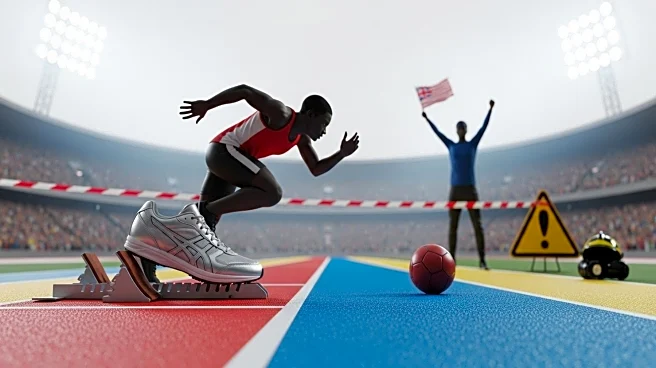What's Happening?
Oblique Seville, a Jamaican sprinter, has achieved a significant milestone by winning the 100-meter race at the World Athletics Championships. Seville, who trained under Usain Bolt's coach Glen Mills at the Racers Track Club, secured the gold medal with a time of 9.77 seconds. This victory was particularly momentous as it was witnessed by Usain Bolt himself, who cheered Seville on during the race. Seville's triumph comes after narrowly missing out on medals in previous championships, where he finished fourth twice. His performance in Tokyo was marked by overcoming intense competition from fellow Jamaican Kishane Thompson and reigning Olympic champion Noah Lyles, who finished second and third, respectively.
Why It's Important?
Seville's victory is a significant achievement for Jamaica, a country with a rich history in sprinting, as it marks the return of the men's 100m global gold medal to Jamaica for the first time since Usain Bolt's win in 2016. This win not only highlights Seville's personal growth and resilience but also reinforces Jamaica's dominance in the sprinting world. The success of athletes like Seville continues to inspire young sprinters in Jamaica and around the world, showcasing the importance of dedication and perseverance in sports. Additionally, this victory may boost Jamaica's reputation in international athletics, potentially attracting more attention and resources to the country's sports programs.
What's Next?
Following his victory, Seville is likely to focus on maintaining his form and preparing for future competitions, including defending his title in upcoming world championships and potentially the next Olympic Games. His success may also lead to increased expectations and pressure to perform at a high level consistently. For Jamaica, Seville's win could encourage further investment in athletics, aiming to nurture and develop future champions. The global athletics community will be watching closely to see if Seville can continue his winning streak and how his career progresses in the coming years.
Beyond the Headlines
Seville's journey to becoming a world champion underscores the importance of mental fortitude in sports. His ability to overcome past disappointments and injuries highlights the psychological resilience required to succeed at the highest levels of competition. This aspect of his story may inspire discussions about the role of mental health and support systems in athletic training and performance. Furthermore, Seville's success may influence the cultural perception of sprinting in Jamaica, reinforcing its status as a national sport and a source of pride.








